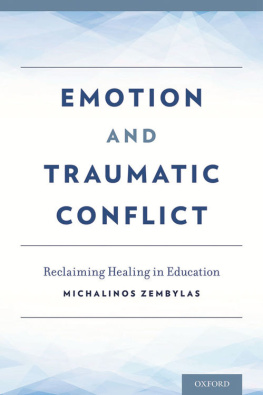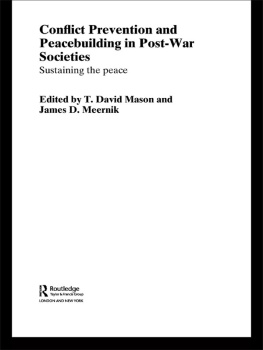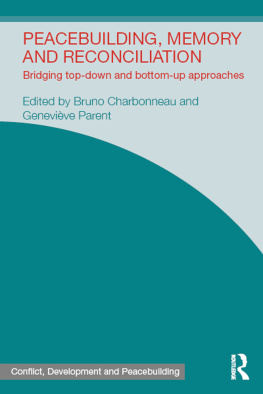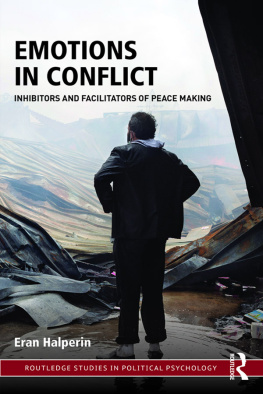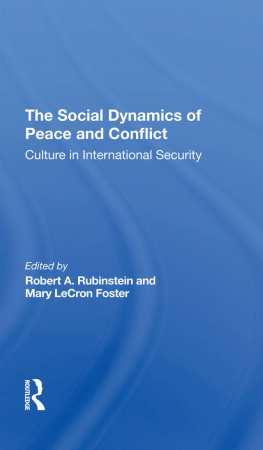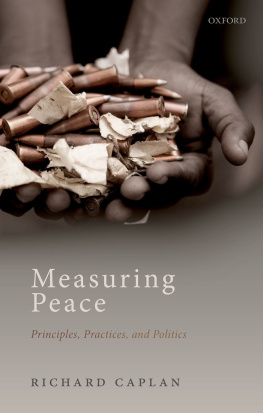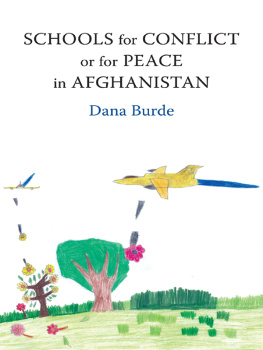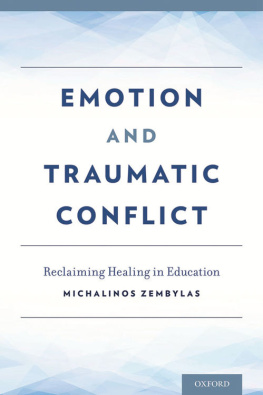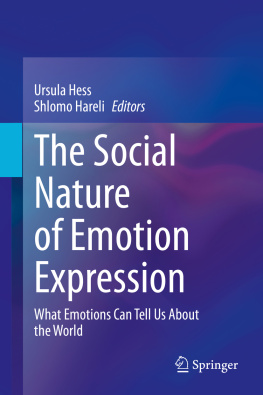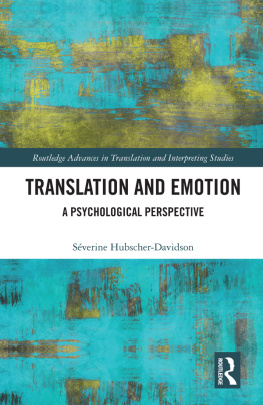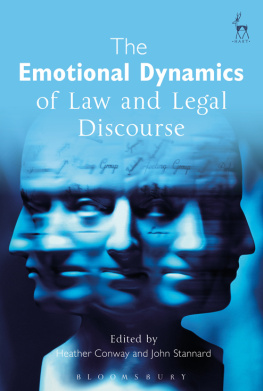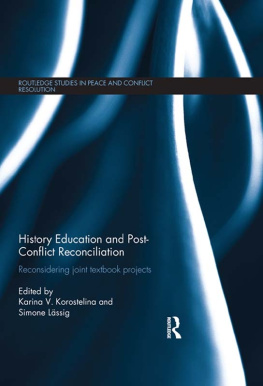EMOTION AND TRAUMATIC CONFLICT
EMOTION AND TRAUMATIC CONFLICT
Reclaiming Healing in Education
Michalinos Zembylas


Oxford University Press is a department of the University of Oxford. It furthers the Universitys objective of excellence in research, scholarship, and education by publishing worldwide.
OxfordNew York
AucklandCape TownDar es SalaamHong KongKarachi
Kuala LumpurMadridMelbourneMexico CityNairobi
New DelhiShanghaiTaipeiToronto
With offices in
ArgentinaAustriaBrazilChileCzech RepublicFranceGreece
GuatemalaHungaryItalyJapanPolandPortugalSingapore
South KoreaSwitzerlandThailandTurkeyUkraineVietnam
Oxford is a registered trademark of Oxford University Press in the UK and certain other countries.
Published in the United States of America by
Oxford University Press
198 Madison Avenue, New York, NY 10016
Oxford University Press 2015
All rights reserved. No part of this publication may be reproduced, stored in a retrieval system, or transmitted, in any form or by any means, without the prior permission in writing of Oxford University Press, or as expressly permitted by law, by license, or under terms agreed with the appropriate reproduction rights organization. Inquiries concerning reproduction outside the scope of the above should be sent to the Rights Department, Oxford University Press, at the address above.
You must not circulate this work in any other form and you must impose this same condition on any acquirer.
Library of Congress Cataloging-in-Publication Data
Zembylas, Michalinos.
Emotion and traumatic conflict : reclaiming healing in education / Michalinos Zembylas.
pages cm
Includes bibliographical references and index.
ISBN 9780199982769 (alk. paper)
eISBN 9780199982783
1.Affective education.2.Psychic trauma in children.3.Emotional problems of children.4.EmotionsStudy and teaching.5.Conflict managementStudy and teaching.6.PeaceStudy and teaching.7.Educational psychology.8.Multicultural education.9.EducationSocial aspects.10.EducationPolitical aspects.I.Title.
LB1072.Z46 2015
370.1534dc23
2015002129
History, despite its wrenching pain
Cannot be unlived, but if faced
With courage, need not be lived again.
MAYA ANGELOU, On the Pulse of Morning
Losing too is still ours; and even forgetting
still has a shape in the kingdom of transformation.
When somethings let go of, it circles; and though we are
rarely the center
of the circle, it draws around us its unbroken, marvelous
curve.
RAINER MARIA RILKE, Losing
One should neither laugh nor cry at the world, but understand it.
SPINOZA
CONTENTS
I am privileged to have many good friends and colleagues who have supported me in numerous ways while I was writing this book. I acknowledge the contributions of Zvi Bekerman, Monique Eckmann, Claire McGlynn, Rob Hattam, Phillip Hammack, Tony Gallagher, Constadina Charalambous, Panayiota Charalambous, Helena Flam, Andre Keet, Jochen Kleres, Vivienne Bozalek, Dorothee Holscher, Jonathan Jansen, Brenda Leibowitz,Ronelle Carolissen, Zeus Leonardo, Sharon Chubbuck, Lynn Fendler, J.C. van der Merwe, Maija Lanas, all of whom have been exceptional intellectual partners in discussing many of the issues raised in this book.
In addition I thank Petros Pashiardis, Athena Michaelidou, Panayiota Kendeou, Charalambos Vrasidas, Sotiris Themistocleous, Dimitris Hadjisofoklis, Stalo Lesta, Galatia Agathocleous, Elena Papamichael, Maria Hamali, Andreas Pavlakis, and Stavros Stavrou for their friendship and support. I have also benefited enormously from discussions with audiences at the Max Planck Institute for Human Development (Berlin), Stellenbosch University, University of the Western Cape, Queens University Belfast, Hebrew University Jerusalem, Marquette University, Oulu University, University of South Australia, and University of the Free State, where I was privileged to have been given the opportunity to present early versions of this work. I have also presented versions of this work at conferences and much of the material in this book took shape in various journals. I am thankful to have had the opportunity to re-work and enrich this material. Thanks to the Open University of Cyprus for its funding to conduct the research on which this book is based. I was also lucky to have expert editorial assistance from Abby Gross, who supported me from the very beginning of this endeavor.
My greatest debt is to my familymy wife Galatia and my children Orestis and Marizawho are always patient and loving and who tolerate the (difficult) time I spend away from them.
Portions of this volume have been adapted from other works by Michalinos Zembylas.
. Investigating the emotional geographies of exclusion in a multicultural school. Emotion, Space and Society, 4, 151159.
. Racialization/ethnicization of school emotional spaces: The politics of resentment. Race Ethnicity & Education, 13(2), 253270.
. Childrens construction and experience of racism and nationalism in Greek-Cypriot primary schools. Childhood, 17(3), 312328.
. Greek-Cypriot teachers constructions of Turkish-speaking childrens identities: critical race theory and education in a conflict-ridden society. Ethnic and Racial Studies, 33(8), 13721391.
. Negotiating co-existence in divided societies: Teachers and students perspectives at a shared school in Cyprus. Research Papers in Education, 25(4), 433455.
. Pedagogic struggles to enhance inclusion and reconciliation in a divided community. Ethnography and Education, 5(3), 277292.
. The emotional complexities of our and their loss: The vicissitudes of teaching about/for empathy in a conflicting society. Anthropology & Education Quarterly, 44(1), 1937.
. The affective (re)production of refugee representations through educational policies and practices: Reconceptualizing the role of emotion for peace education in a divided country. International Review of Education, 58(4), 465480.
. Citizenship education and human rights in sites of ethnic conflict: Toward critical pedagogies of compassion and shared fate. Studies in Philosophy and Education, 31, 553567.
. Reclaiming nostalgia: Counter-memory, aporetic mourning, and critical pedagogy. Discourse: Studies in the Cultural Politics of Education, 32(5), 641655.
Scars have the strange power to remind us that our past is real.
CORMAC MCCARTHY, All the Pretty Horses
As my sufferings mounted I soon realized that there were two ways in which I could respond to my situationeither to react with bitterness or seek to transform the suffering into a creative force. I decided to follow the latter course.
MARTIN LUTHER KING, JR.
Healing is a matter of time, but it is sometimes also a matter of opportunity.
HIPPOCRATES
Traumatic events, such as wars, genocides, and terrorist attacks, generate powerful emotionsmost notably, fear, grief, anger, shame, resentment, and hatred () argue that it is often these powerful emotions, rather than material interests, that pose the most serious obstacles to peacebuilding, healing, and reconciliation efforts.

